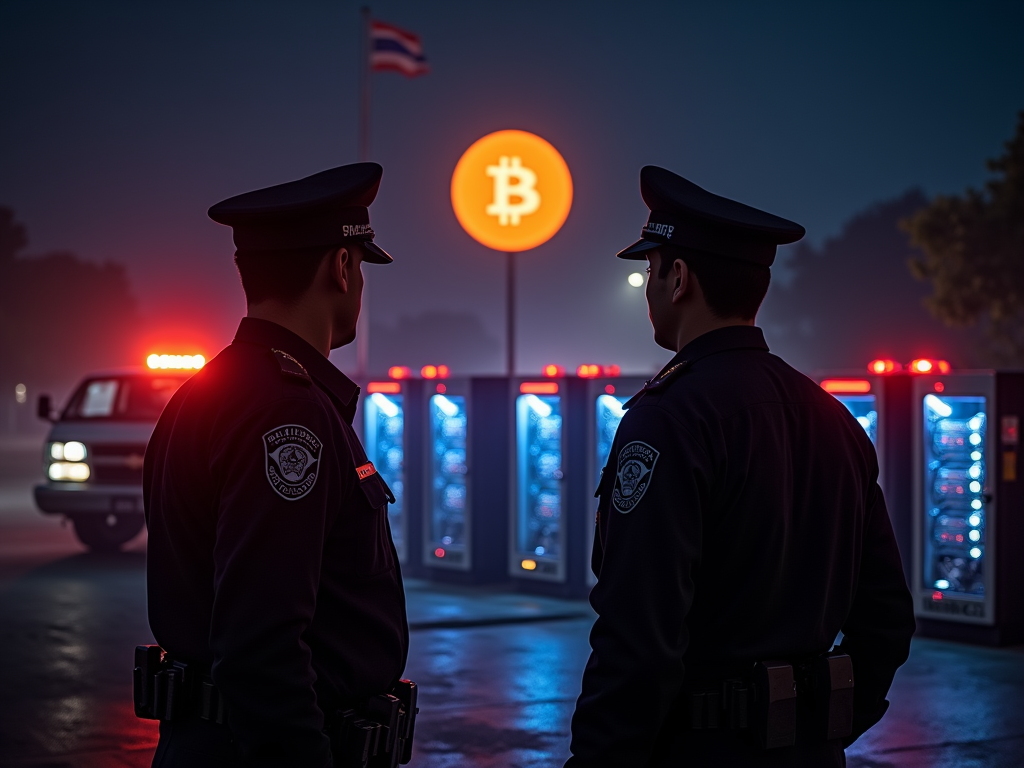Key Points
- Thai authorities raided an illegal bitcoin mining operation in Ratchaburi town, west of Bangkok, following complaints of frequent power outages in the area.
- This incident is part of a broader trend of illegal cryptocurrency mining in Southeast Asia, which has surged following China’s crackdown on mining activities in 2021.
Raid Uncovers Illegal Mining Operation
Thai authorities, including local police and officials from the Provincial Electricity Authorities (PEA), raided a house in Ratchaburi town on Friday. According to a South China Morning Post report, the operation was prompted by residents’ complaints of frequent blackouts in the area for over a month.
Jamnong Chanwong, a chief district security officer, stated, “We found bitcoin mining rigs, pointing to people using this house to operate a mine and using the power they didn’t fully pay for.” He further explained that while electricity consumption records for the house showed high usage, very little had been paid for.
The Challenge of Cryptocurrency Mining in Thailand and Southeast Asia
The incident in Ratchaburi highlights a growing issue across Southeast Asia. Following China’s crackdown on cryptocurrency mining in 2021, many miners relocated to Southeast Asian countries, attracted by relatively affordable electricity and available infrastructure. This shift has led to a surge in illegal mining activities, often involving electricity theft, in countries such as Thailand, Malaysia, Indonesia, and Laos.
In Thailand, bitcoin miners are classified as manufacturers and must pay associated taxes. However, illegal mining operations have been rising for years, posing challenges for local authorities and power suppliers. Mining virtual currencies like Bitcoin requires powerful computers that consume substantial electricity, often leading to unauthorized power usage and straining local electrical grids.
Regional Trends and Enforcement Efforts
Malaysia, for instance, has become a hotspot for illegal Bitcoin mining, ranking among the top ten countries globally regarding hash rate contribution. Malaysian authorities have taken drastic measures, including using steamrollers to destroy confiscated mining equipment worth over $1.25 million.
Indonesia has also seen a significant increase in Bitcoin mining activities, with miners capitalizing on the country’s infrastructure and skilled labor. Such operations have prompted regional authorities to intensify their efforts to curb illegal mining.
Investigation and Aftermath of the Thai Raid
The raid in Ratchaburi on Friday followed an unsuccessful attempt to enter the premises on Thursday when a guard denied authorities access. Upon returning with a search warrant, the team discovered that most of the mining equipment had been moved.
Jamnong revealed that a company had rented the house for approximately four months. However, the power outages only began in mid-July, suggesting that this was when the mining operation likely became fully operational.
No arrests were made during the raid, and the investigation is ongoing. This incident marks the fourth time this year that authorities have raided an illegal bitcoin mine in Ratchaburi province, indicating a persistent issue in the region.
As cryptocurrency mining continues to grow globally, Southeast Asian authorities face the ongoing challenge of balancing technological innovation with regulatory compliance and the needs of local communities affected by these operations. The allure of competitively priced power and the lack of stringent regulations compared to China have made Southeast Asia an attractive destination for Bitcoin miners. However, the illegal aspect of these operations, primarily due to electricity theft, continues to pose significant challenges for law enforcement across the region.













